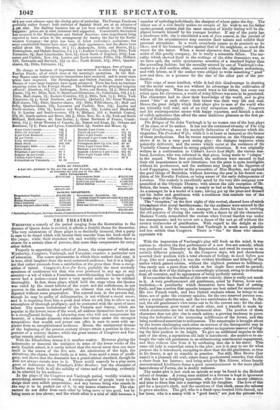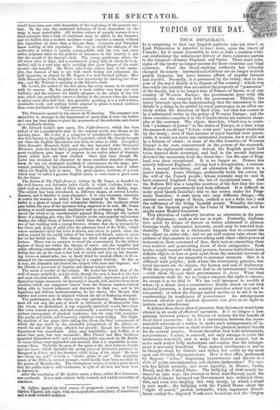With the impression of Vanbrugh's play still fresh on the
mind, it was curious to observe the first performance of a new five-act comedy, which was produced on Thursday at the Haymarket, and owed its success to an entirely different principle. In the Congreve days, wit and shrewdness asserted their position with a total absence of feeling; in Look before you Leap, (the new comedy,) it was the evident kindliness and hilarity of the author which gained esteem, without the slightest pretence to brilliancy. One rarely sees a piece from which so few single lines could be quoted; and yet the flow of the dialogue is exceedingly pleasant, owing to its freedom from all restraint, and its appearance of being perfectly natural.
If we consider the foundation of this new comedy, there is really not much in it. A very goodhumonred old gentleman, acted by Farren, loves con- tradiction,—a peculiarity which dramatists have been fond of setting forth; and has a notion that opposite tempers are best suited for matrimony. His two French wards, and two Oxford students whom he brings to see them, are of quite the contrary opinion; for the two reserved persons con- ceive a mutual attachment, and the two rattlebrains do the same. In the end, the old gentleman's view turns out to be the correct one; for the simi- lar temperaments grow weary of each other, and a transfer is made by which contrarieties are led to the hymeneal altar. The position of these characters does not give rise to much action; a growing tendency to yawn being the indication of the increasing indifference of the lovers, and this being continued somewhat to tediousness. The catastrophe is brought about by the lovers challenging each other on account of the disrespectful way in which each speaks of his own mistress,—rather an ingenious manner of bring- ing the false position to its height. To give an additional impulse to this part of the story, a mysterious old lady is introduced: she contrives to en- tangle the vain old gentleman in an embarrassing matrimonial engagement, and then relieves him from it by confessing that she is his sister. This same old lady is somewhat extra to the plot; nor is it easy to see for what purpose she is introduced, excepting to show that the old gentleman, so true in his theory, is apt to stumble in practice. But still, Miss Brown (her name) is a pleasant old soul; utters many goodnatured remarks, that elicit a cheer from her hearers; and being acted by Mrs. Glover, whose hearey unconstrained kindliness forms a good accompaniment to the more placid benevolence of Farren, she is doubly welcome.
The under-plot is just such an episode as may be found in the Holcroft school of dramas. A young man entitled to a fortune is kept in ignorance of this fact by a designing hypocrite, who allows him a scanty pittance, and tries to force him into a marriage with his daughter. The love of this girl for a lawyer's clerk, and the exertions of that clerk, cause the scheme to prove abortive. The girl, who is a frank open-hearted little damsel, and her lover, who is a scamp with a " good heart," are just the persons who
would have been pets with dramatists of the beginning of the present cen- tury. By the way, the continued influence of those dramatists on the stage is most remarkable. All modern writers of comedy assume it as a fixed principle that a dash of sentiment must be added to the humour; and we believe that a modern audience would consider a comedy without this ingredient no more than a five-act farce. Congreve and Farquhar knew nothing of this regulation. The way in which the dialogue of the under-plot is written is equally commendable with the rest, and some rather poignant satire on the position of literature in this country is put into the mouth of the lawyer's clerk. The young gentleman, whom the old miser tries to dupe, and a sentimental young lady to whom he is at- tached, talk in a very nice style, avoiding that great danger of the senti- mental—the maudlin. Mr. Howe, who is the serious hero of the under- plot, has learned of late to act with much feeling and judgment; the cold hypocrite, as played by Mr. Rogers, is a well-finished picture; Miss Julia Bennett has, in the daughter, a new opportunity for showing her viva- city; and Mr. Webster is amusing as the lawyer's clerk.
Mr. Lovell, the author of the new piece, has every reason to be satisfied with its success. He has produced a work neither very deep nor very brilliant; and the subjects are hardly adequate to the extent of the five acts, which last peculiarity causes a decline in the interest when the drama is rather more than half over: but, generally speaking, it is a well-written, creditable work, and perhaps better adapted to please a mixed audience than some productions of higher pretension.



























 Previous page
Previous page